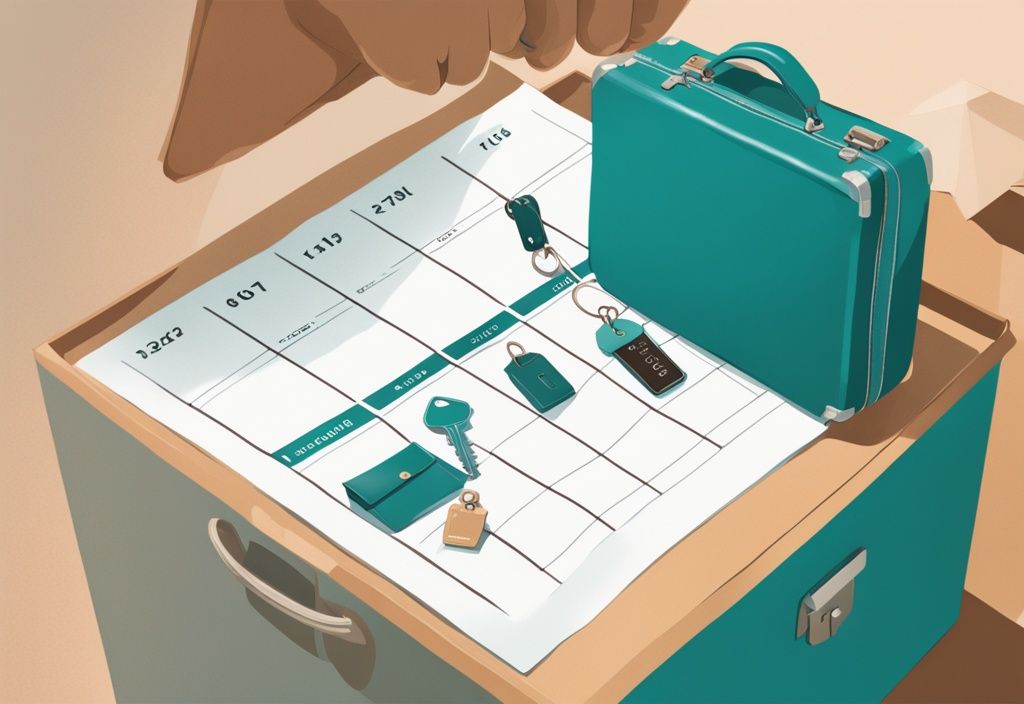When a Guest Becomes a Tenant: Key Facts & Tips
Ever wondered at what point a guest overstaying their welcome suddenly turns into an unexpected tenant? It’s a question that often leaves property owners scratching their heads. As a seasoned home security expert, I’ve seen how confusing this can be, not just for landlords but also for tenants.
This article will help you understand the critical differences, signs, and legal implications of a guest morphing into a tenant. It’s not just about avoiding awkward conversations, but also about protecting your legal and financial interests.
Whether you’re a landlord wanting to prevent unauthorized long-term stays or a tenant seeking clarity, this guide is for you. After all, isn’t it better to be informed and prepared rather than caught off guard? Let’s dive in and demystify the transition from guest to tenant.
Understanding the Difference Between a Guest and a Tenant
When it comes to property, knowing the difference between a guest and a tenant is crucial. This section will break down the definitions and key differences to help you understand when a guest becomes a tenant.
Definition of a Guest
A guest is someone who visits your property for a short period, usually with your permission. They don’t pay rent and have no legal rights to the property. Think of family members visiting for a weekend, friends crashing for a few days, or a romantic partner staying over occasionally.
Definition of a Tenant
A tenant, on the other hand, has signed a lease or rental agreement with the landlord. They have the right to live in the property for a set time and pay rent regularly. Tenants are also responsible for maintaining the property and following the lease terms.
Key Differences
Tenants are listed on the lease; guests are not. This is a big deal because tenants have legal rights and responsibilities under landlord-tenant laws, which guests don’t have. Tenants pay rent and might share utility costs, while guests usually don’t chip in financially.
The length of stay is another key factor. Guests are there for short visits, while tenants live in the property long-term. This distinction helps you know when a guest might be crossing the line into tenant territory.
Signs a Guest is Becoming a Tenant
When does a guest become a tenant? This question often arises when a visitor’s behavior starts to change, indicating a shift from temporary guest to long-term resident. Here are some key indicators to watch for:
Behavioral Indicators
One of the primary signs is a noticeable shift in behavior. If a guest starts staying every night or most nights, it suggests they are transitioning from a temporary visitor to a long-term resident. Possessing a key to the property is another significant sign, as it indicates a level of access and permanence typically reserved for tenants.
Additionally, if the guest is present more than 50% of the time, it further blurs the line between guest and tenant. Lastly, if they begin making maintenance requests, they are assuming responsibilities and privileges that are characteristic of tenants, not guests.
Physical Indicators
Physical changes in the property can also signal when a guest becomes a tenant. Moving furniture or personal items into the property is a clear indication that the guest is settling in for the long haul. Receiving mail or bills at the property is another strong sign, as it denotes the guest is using the address as their primary residence.
Parking their vehicle at the property daily further reinforces their presence as a regular occupant rather than a transient visitor.
Financial Contributions
Financial involvement is a crucial factor in determining when a guest becomes a tenant. If the guest starts contributing to rent or utility bills, they are assuming financial responsibilities typical of a tenant. Paying for groceries or other household expenses also indicates a deeper level of commitment to the household.
In some cases, guests may provide services in lieu of rent, such as cleaning or maintenance, which further integrates them into the daily operations of the household, making it harder to distinguish them from tenants.
Legal Implications of a Guest Becoming a Tenant
When does a guest become a tenant? This question carries significant legal weight. Understanding the transition from guest to tenant is crucial, as it brings about distinct rights and responsibilities.

Rights and Responsibilities of a Tenant
When does a guest become a tenant? This transition triggers significant legal implications. Tenants possess specific rights and responsibilities that differ markedly from those of guests. For instance, tenants have the right to privacy and a habitable home, meaning the landlord must provide a safe and livable environment. Additionally, tenants are entitled to necessary repairs and maintenance, ensuring the property remains in good condition.
On the flip side, tenants have several responsibilities. They must pay rent on time, which is a fundamental obligation under any lease agreement. Tenants are also responsible for keeping the property clean and in good order. Adhering to the lease terms is crucial, as these terms outline the conditions of their stay, including rules about property use, noise levels, and other community guidelines. Failure to comply with these responsibilities can lead to penalties, including eviction.
Eviction Process for Unauthorized Tenants
When does a guest become a tenant without landlord consent? Such a scenario can lead to the classification of the individual as an unauthorized tenant. Landlords must navigate a formal eviction process to remove unauthorized tenants, a procedure that varies by jurisdiction but generally follows a structured path.
First, the landlord must provide formal notice to the unauthorized tenant, informing them of the breach of terms and the requirement to vacate the premises. If the tenant does not comply, the next step typically involves filing a lawsuit for eviction. This legal action requires the landlord to present their case in court, demonstrating that the guest has indeed become a tenant without proper authorization.
Upon successful litigation, the landlord must obtain a court order for eviction. This order legally mandates the unauthorized tenant to leave the property. The eviction process can be complex and time-consuming, often requiring legal representation to navigate effectively. Each jurisdiction has specific steps and requirements, emphasizing the importance of understanding local landlord-tenant laws to manage such situations appropriately.
Preventing Unauthorized Long-Term Stays
Including Guest Policies in the Lease
To tackle the issue of when does a guest become a tenant, it’s crucial to have clear guest policies in the lease agreement. Think of it like setting house rules for a party. You wouldn’t want someone overstaying their welcome, right?
Firstly, the lease should specify the maximum number of days a guest can stay, typically around 10-14 days. This helps tenants understand the boundary between a guest and a tenant.
Additionally, the lease should require landlord approval for any stays longer than the specified period. This ensures that the landlord is aware of any potential long-term guests and can take appropriate action if necessary. For more information on securing your property, consider reading about the different types of Security Gates available.
Finally, the lease should include consequences for violating guest policies, such as potential eviction. This sets a clear expectation and helps in maintaining the integrity of the rental agreement.
Monitoring Guest Activity
Monitoring guest activity is crucial to preventing unauthorized long-term stays and addressing the question of when does a guest become a tenant.
Property owners should keep track of frequent visitors and their duration of stay. This can be done through regular communication with tenants and by maintaining a log of visitors.
It’s also important to communicate with tenants about any concerns regarding long-term guests. Open communication can help resolve issues before they escalate.
Furthermore, conducting regular property inspections ensures compliance with the lease terms. These inspections can help identify signs of unauthorized tenants, such as personal belongings or mail addressed to the guest.
By being proactive and vigilant, landlords can effectively manage their properties and prevent unauthorized long-term stays.
Adding Long-Term Guests to the Lease
When considering when does a guest become a tenant, it’s essential to follow a structured approach to formalize their status. This section will guide you through the necessary steps and the screening process to ensure a smooth transition.
Steps to Add a Guest to the Lease
When pondering when does a guest become a tenant, it’s crucial to have a clear plan. Start by discussing the situation with the tenant. Emphasize the importance of adding the long-term guest to the lease for legal and financial clarity. This conversation should cover the potential implications and benefits of formalizing the guest’s stay.
Next, screen the guest just as you would any potential tenant. This thorough screening process helps ensure the guest’s suitability and reliability as a tenant. After the screening, draft a lease addendum to officially include the guest as a tenant. This document should outline the terms and responsibilities of the new arrangement.
Finally, ensure that all parties involved—the landlord, the tenant, and the new guest—sign the lease addendum. This step formalizes the guest’s transition to a tenant, providing legal accountability and protection for everyone involved.

Screening Process for Long-Term Guests
The screening process is crucial when determining when does a guest become a tenant. Begin by conducting comprehensive background checks, which include credit and criminal history. This step helps identify any potential risks associated with the guest.
Next, verify the guest’s employment and income to ensure they can contribute to rent and other expenses. This financial vetting is essential for maintaining the property’s financial stability. Additionally, check references from previous landlords or other relevant sources. These references provide insights into the guest’s rental history and reliability.
By following these steps, you can effectively manage the transition of a long-term guest to a tenant, ensuring both legal compliance and the well-being of your property.
State-Specific Regulations on Guests Becoming Tenants
Overview of State Laws
State laws vary significantly when determining when a guest becomes a tenant, often based on the number of consecutive days stayed at a property. Some states have specific timeframes that outline this transition, while others consider additional factors such as financial contributions or the nature of the guest’s presence. Understanding these regulations is essential for landlords and tenants alike to ensure compliance and avoid potential legal issues.
Examples of State Regulations
- Alabama: A guest is considered a tenant after 30 days.
- Arizona: The transition occurs after 29 consecutive days.
- California: A guest becomes a tenant after over 14 days within six months or seven consecutive nights.
- Colorado: Guests staying over 14 days within six months are considered tenants.
- Connecticut: Similar to Colorado, over 14 days within six months marks the transition.
- Florida: Guests are considered tenants after over 14 days within six months or seven consecutive nights.
- Georgia: Payment of rent or contribution to chores can signify tenant status.
- Illinois: Establishing residency without landlord permission transitions a guest to a tenant.
- Indiana: Staying over 14 days within six months qualifies a guest as a tenant.
- Kentucky: The transition occurs after 30 days or as specified in the lease.
- Maine: Over 14 days within six months can make a guest a tenant.
- Maryland: Financial contributions towards rent or services can signify tenant status.
- Minnesota: Similar to Maryland, financial contributions or services indicate tenant status.
- Mississippi: Payment of rent transitions a guest to a tenant.
- Missouri: Staying over 14 days within a year qualifies a guest as a tenant.
- Montana: The lease terms or seven consecutive days determine tenant status.
- New York: A guest becomes a tenant after 30 days.
- North Carolina: The transition occurs after 14 days.
- Ohio: A guest is considered a tenant after 30 days.
- Pennsylvania: Staying for 30 days or paying the landlord signifies tenant status.
- Tennessee: Payment of rent or lease terms can transition a guest to a tenant.
- Texas: Contribution to rent, bills, or using the property as a mailing address can indicate tenant status.
Insurance and Liability Considerations
The transition from guest to tenant can have significant implications for property owners, especially regarding insurance and liability. Understanding when a guest becomes a tenant is crucial to ensure proper coverage and avoid potential legal issues.
Impact on Property Insurance
The shift from guest to tenant can dramatically impact your property insurance. When does a guest become a tenant? This is a vital question for property owners. Insurance policies often require tenants to be officially listed to guarantee adequate coverage. If long-term guests aren’t listed on the lease, you might face denied claims, leaving you financially exposed. Insurance companies need to know exactly who lives on the property to assess risks accurately. So, it’s essential to update your insurance policies to reflect any changes in the status of individuals living on your property.

Liability Issues for Property Owners
As a property owner, you’re responsible for the actions of both guests and tenants. When does a guest become a tenant? This transition can increase your liability and lead to legal complications if not managed properly. Unauthorized tenants—those not formally added to the lease—pose significant risks. They might not be covered under existing insurance policies, leading to potential out-of-pocket expenses for damages or injuries.
Ensuring proper insurance coverage and strict adherence to lease terms is crucial. Regular inspections and open communication with tenants can help prevent unauthorized long-term stays. This proactive approach protects everyone involved and ensures compliance with legal and insurance requirements.
FAQ
How long can a guest stay before becoming a tenant?
Understanding when a guest becomes a tenant is crucial. The duration varies by state and lease terms, typically ranging from 14 to 30 days. Always check local regulations to stay informed.
What should I do if a guest refuses to leave?
First, communicate with the tenant and reference the lease agreement. If the situation escalates, begin the formal eviction process as per local laws. Consulting a legal expert can also be beneficial.
How can I prevent guests from becoming unauthorized tenants?
Clear guest policies in the lease are essential. Monitor guest activity and communicate any concerns with tenants. Regular property inspections help ensure compliance with lease terms.
What are the benefits of adding a long-term guest to the lease?
Adding a long-term guest to the lease offers several benefits:
- Legal Accountability: Ensures all parties are legally protected.
- Financial Clarity: Provides clear financial responsibilities.
- Community Rules: Ensures adherence to community rules.
- Enhanced Security: Improves security and insurance coverage.
- Rental History: Helps build a rental history for the guest, making future rentals easier.
Conclusion
Understanding the transition from guest to tenant is crucial for both legal and insurance purposes, especially when considering the implications of landlord-tenant law, which regulates various aspects of rental agreements. Property owners must stay informed about when does a guest become a tenant to ensure compliance with local regulations and avoid potential legal complications. Each state has specific laws that define the duration and conditions under which a guest becomes a tenant. Property owners should be well-versed in these regulations to manage their properties effectively.
Ensuring proper lease terms is another essential aspect. Clearly defined guest policies within the lease can help prevent misunderstandings and unauthorized long-term stays. These terms should specify the maximum number of days a guest can stay and outline the procedure for obtaining landlord approval for extended stays. By setting these boundaries, property owners can maintain control over their properties and avoid the complexities that arise when a guest inadvertently becomes a tenant.
Clear communication and proactive management are key strategies in preventing unauthorized long-term stays. Regularly monitoring guest activity and conducting property inspections can help property owners stay ahead of potential issues. Open lines of communication with tenants about guest policies and any concerns can also foster a cooperative relationship and ensure compliance with lease terms.
Finally, property owners should be aware of the insurance implications of having long-term guests who are not listed on the lease. Insurance coverage may be affected, and claims could be denied if a guest has effectively become a tenant without proper documentation. Ensuring all residents are appropriately listed on the lease can help maintain adequate insurance coverage and reduce liability risks.
By understanding when does a guest become a tenant, property owners can protect themselves legally and financially, ensuring a harmonious living environment for all parties involved.
I’m James Albright, a home security expert with over 15 years of experience, and I’m passionate about helping families protect what matters most. After serving as a police officer, I transitioned to security consulting to share my hands-on knowledge and practical tips. My mission is to make home security simple and reliable by offering clear, no-nonsense advice and easy-to-follow guides. When I’m not reviewing the latest security tech or writing, I’m out in the community leading neighborhood watch programs and, most importantly, keeping my own family safe.





Post Comment